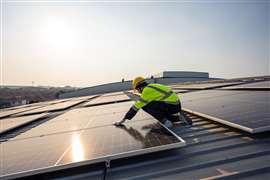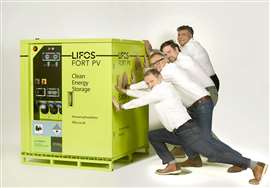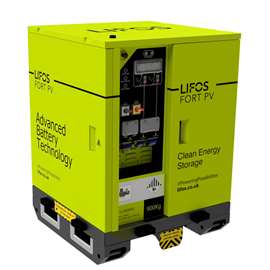Chasing the sun: The British manufacturer attempting to bring solar power to construction sites
27 June 2023
Solar panel specialist Lifos has launched a battery energy storage system designed to be used on construction sites. Business development director Richard Atwal gives KHL’s Lucy Barnard the low down
Richard Atwal, responsible for business development at Lifos, a British manufacturer attempting to deploy solar panels on construction sites, gestures out of the window at a cloudy sky and shrugs. These days, even in an overcast office in Shropshire, solar’s appeal can be hard to resist.
Once seen as a niche way to provide power on board satellites and in remote terrestrial locations, solar power, through a combination of Chinese industrial might and European subsidies, has over the last 40 years become not only cheap but mainstream.
According to the International Energy Agency, power generation from solar photovoltaic cells has become the cheapest source of energy in the world and currently accounts for around 3.6 per cent of global electricity generation.
 Installing solar panels on the rook of a building. Photo: Adobe Stock
Installing solar panels on the rook of a building. Photo: Adobe Stock
Certainly, as prices for PV cells have become cheaper and utility prices become more expensive, the number of homes and businesses choosing to install solar panels on their roofs has expanded rapidly, with the PV cell market growing to US$ 165.47 billion in 2023 and foreast to reach US$ 355.24 billion by 2033.
With the war in Ukraine pushing utility prices to new global highs and prompting governments to lend support to attempts at energy independence, manufacturers around the world have been springing up, attempting to bring cheap solar power to an ever-growing number and range of users.
Lifos’ parent company Solar Technology International is one of these, specialising in bringing the sun’s power to a range of specialisms, ranging from the motorised ramps and jetways used to allow passengers embark and disembark from aircraft, to remote monitoring systems providing land slip warnings.
In 2017 the team started looking at creating panels linked to lithium battery storage for applications such as glamping, location broadcasting, civil engineering and construction – and Lifos was born.
“The solar panels are really how our company started,” Atwal says. “In our heads we thought the battery storage would drive it, but actually what’s been driving it is the solar.”
Solar drives sales
“People were saying to us that we’ve got a battery storage system, they’ve told us it can work with solar panels, how can you do this?” Atwal says. “Well, it’s not quite that simple. There’s a little bit of electronics and a bit of connectivity involved. So, we said we could actually do this ourselves. We could put this all together and bring meaningful solar to construction, to various industries.”
In March the company launched its largest unit so far, the Fort, aimed partly at construction equipment rental firms. The lithium-ion phosphate battery comes in three storage capacities: 12, 23 and 35 kW-h. They are controlled and monitored by the LiQ battery management system.
It also comes in a kit which also includes 18 solar panels able to deliver a maximum 3.4 kW. The panels can be assembled on top of, for example, any standard 20 foot cabin, such as a site office, or split to go on top of two 10 foot cabins, or ground mounted.
 The Lifos team, including Richard Atwal, top right. Photo: Lifos
The Lifos team, including Richard Atwal, top right. Photo: Lifos
“It’s the first time lots of people have really seen easy-to-implement meaningful solar power,” Atwal says. “It will actually power what you want it to power.”
With prices for the smallest boxes starting at around £15,000 (US$19,000) and average prices standing at between £35,000 and £45,000 ($44,000 and $56,000) and rising to £80,000 ($100,000), Atwals says the units are around double the price of a diesel generator – and will still usually require a backup diesel generator to keep the building site running.
“We did some trials with a contractor using a 60 kVA diesel generator and the customer was saving over £1,000 [$1,250] a week in diesel which was just under 100 litres at the time,” Atwal says. “It’s significant. It actually could have been more in the end because they programmed their diesel generator slightly wrong. If you’re saving £1,000 a week, you break even at 40 weeks.”
And, Atwal says, by adding solar panels and battery storage to a site, contractors may also be able to comply with low emissions zone rules which are being introduced to a growing number of cities and which often limit diesel generator run time. The units can also charge from a standard diesel gen set but while the generator is operating at peak efficiency or when local noise regulations permit operation.
Power constraints
Yet Atwal says the models manufactured so far are not big enough to power most large construction equipment. “The panels can give a charge,” he says. “It depends on the site. We’re just doing a job where we’re putting panels on to 12 cabins so it’s quite a lot of power going down. You can power some of the smaller plant equipment like small diggers or machinery. Or you could power two or three electric cars fully with that, no problem at all. But if you had a fleet of big JCBs or tower cranes that’s not happening.”
Halfway through 2024 the company plans to launch a larger battery, providing shipping container-sized boxes which can be delivered by a truck to provide complete power for building sites to power heavy machinery, including tower cranes.
 The Lifos Fort battery storage system. Image: Lifos
The Lifos Fort battery storage system. Image: Lifos
Most importantly, he says, the current pack is powerful enough to provide enough energy to keep alarm systems and perimeter lighting running at night, enabling contractors to switch off their diesel generator during the periods when the site machinery is not operating. This avoids noise disturbance and saves fuel and maintenance costs on the generator itself.
“Our box is important because during the day it sucks all the power in and then at night the site can turn off its diesel generator and keep running,” Atwal says. “You can then turn off the diesel generator completely for 14 hours – so you save all the run time, the diesel, the CO2, and just run it from our battery box.
“Diesel generators, especially the new Stage V generators, don’t like to run at low loads,” Atwal adds. “If they start to run at 10 to 20 % of their capacity, the diesel particulate filters [in the exhaust system] start to block up quite quickly and that causes a big problem for the generator hire companies who have to send someone out to repair them.”
So far, the company says, it has had four or five orders in total, mostly from construction equipment rental companies. The product is so new that even these customers will have to wait until September before they can take delivery.
Atwal says he expects numbers to increase as construction industry customers become more accustomed to the idea.
“Educating customers is the number one barrier to take up,” Atwal says. “It’s a bit like people buying an electric car. People want to know what happens when the batteries go, what happens when the sun isn’t shining. I think as more people get used to using electric equipment in all areas of life then take up will increase dramatically.”
STAY CONNECTED




Receive the information you need when you need it through our world-leading magazines, newsletters and daily briefings.
POWER SOURCING GUIDE
The trusted reference and buyer’s guide for 83 years
The original “desktop search engine,” guiding nearly 10,000 users in more than 90 countries it is the primary reference for specifications and details on all the components that go into engine systems.
Visit Now
CONNECT WITH THE TEAM










